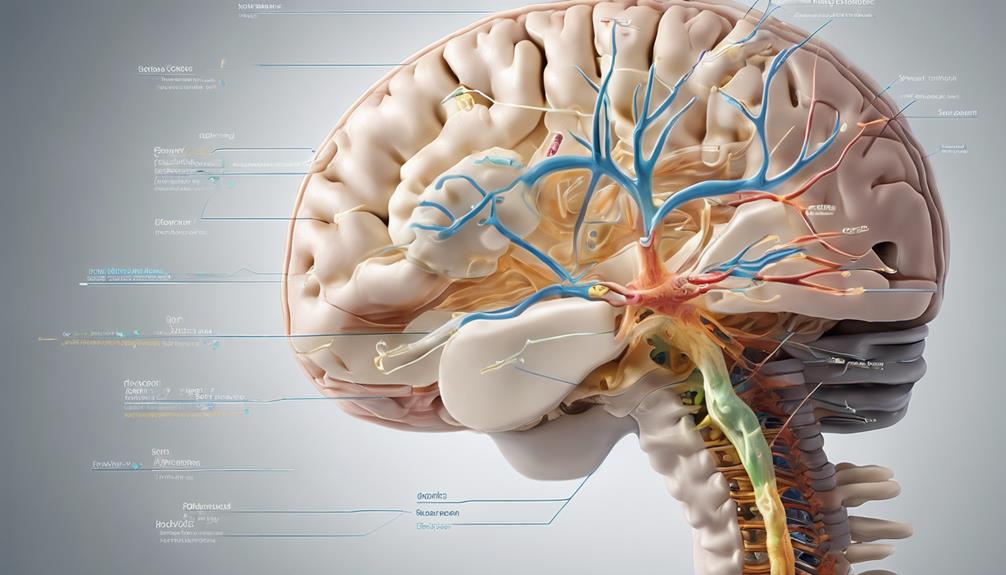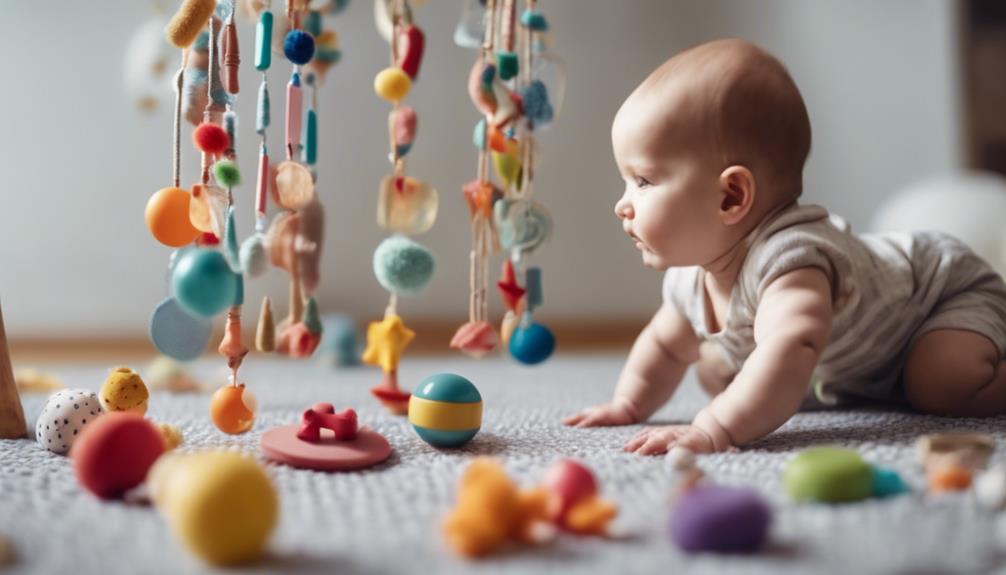To comprehend the development of a baby’s nervous system, it is important to understand that nerve connections begin forming in the womb. The cerebral cortex becomes active during the third trimester, influencing cognitive abilities. Maternal health and interactions play a key role in shaping brain growth. After birth, external stimuli are crucial in strengthening neural pathways. Engaging in play and providing a nurturing environment are essential for supporting brain development. Synaptic connections are vital for learning and motor skills. Positive experiences help in establishing important neural pathways. Early interactions with caregivers are critical for optimal brain development. Developing secure attachments with caregivers helps to regulate emotional well-being. To gain a deeper understanding of baby nervous system development, consider exploring the impact of early experiences on neural pathways.
Key Takeaways
- Nervous system forms nerve connections during pregnancy.
- Cerebral cortex activates in third trimester for cognitive development.
- Early experiences shape neural pathways for future learning.
- Sensory stimuli post-birth strengthen nerve connections.
- Caregiver interactions crucial for healthy nervous system growth.
Importance of Baby Nervous System Development
Understanding the significance of baby nervous system development is essential for recognizing the foundation of a child's cognitive and physical capabilities. The nervous system, responsible for transmitting signals throughout the body, plays a pivotal role in a baby's development during the early years.
As the brain development begins in the womb and progresses post-birth, nerve connections form at different stages of pregnancy. The cerebral cortex, important for higher brain functions, becomes increasingly active in the third trimester, setting the stage for advanced cognitive processes. At birth, babies exhibit early signs of nervous system functionality, such as slight hearing and visual capabilities, showcasing the intricate wiring within their brains.
During the early years, experiences and interactions greatly impact the shaping of the baby's nervous system. According to research, these interactions play an important role in forming neural pathways that influence future learning and behavior. Therefore, fostering a nurturing environment and providing stimulating experiences are essential for the successful nervous system development in babies.
Brain Development in the Womb

During the early stages of pregnancy, nerve connections in a baby's brain begin to form, setting the foundation for future cognitive development. This process of fetal brain development is vital as it lays the groundwork for the intricate network of neurons that will shape the developing brain.
The neural tube, which eventually gives rise to the brain and spinal cord, undergoes rapid growth and differentiation during the first trimester. By the third trimester, the cerebral cortex, the outer layer of the brain responsible for advanced brain functions, becomes increasingly active in the developing baby.
At birth, the baby's brain is already capable of limited hearing and vision, which continue to develop and refine post-birth. It's important to note that brain development in the womb is influenced by various factors such as maternal health, nutrition, and external stimuli. Early interactions and experiences in the womb play a significant role in shaping the developing brain and ultimately impact the baby's future cognitive abilities.
Role of Cerebral Cortex
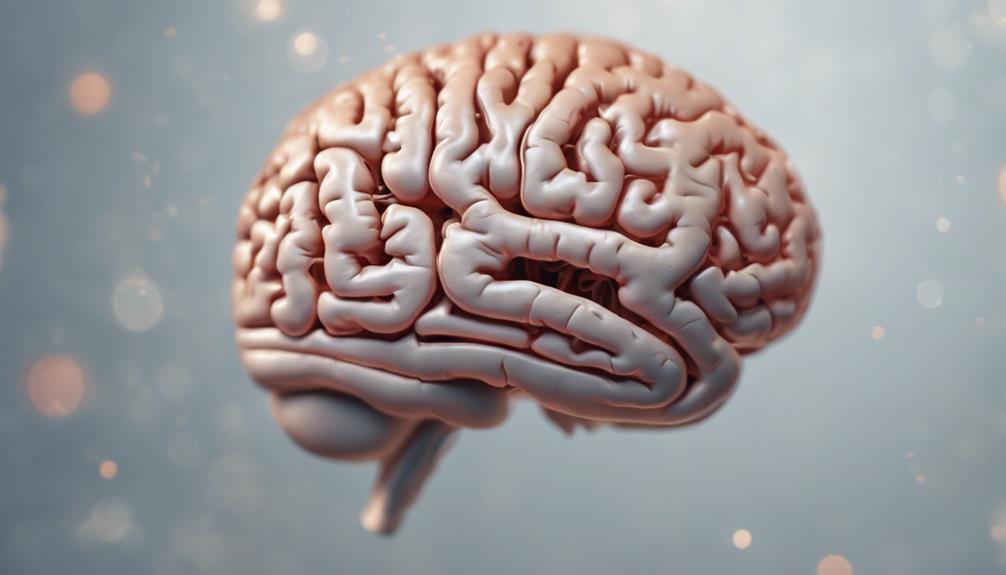
The cerebral cortex, an essential part of brain development, plays a significant role in various functions important for cognitive abilities. It's responsible for memory, attention, language, and awareness, all necessary for your baby's growth.
Understanding how the cortex functions in sensory processing can provide valuable insights into your child's early nervous system development.
Cortex in Brain Development
Development of the cerebral cortex in the brain is essential for higher cognitive functions and plays a pivotal role in shaping cognitive abilities during early childhood. The cerebral cortex, the outer layer of the brain, is responsible for memory, attention, and language processing. It's divided into four lobes: frontal, parietal, temporal, and occipital, each with specific roles in sensory perception and motor function.
During early childhood, the cerebral cortex undergoes significant development with synaptic connections forming rapidly to support learning and adaptation. The prefrontal cortex, located in the frontal lobe, is crucial for decision-making, impulse control, and social behavior, continuing to develop into early adulthood.
The cerebral cortex's plasticity allows for reorganization and adaptation to new experiences, making early childhood a critical period for shaping cognitive abilities and skills.
Functions of Cortex
Understanding the pivotal role of the cerebral cortex in higher brain functions is essential for grasping its significance in cognitive processes. The cerebral cortex is responsible for processing sensory information, controlling voluntary movements, and facilitating cognitive abilities. This outer layer of the brain plays an important role in shaping our perception of the world and our ability to interact with it effectively.
To help you visualize the functions of the cerebral cortex, let's break it down into a simple table:
| Function | Description | Example |
|---|---|---|
| Sensory Information | Processing information from the environment through senses | Recognizing the smell of freshly baked bread |
| Voluntary Movements | Controlling intentional movements of the body muscles | Reaching out to grab a cup of coffee |
| Cognitive Abilities | Supporting various mental processes like thinking, learning, and problem-solving | Solving a complex puzzle |
Through these functions, the cerebral cortex plays an important role in shaping our daily experiences and interactions with the world around us.
Cortex and Sensory Processing
Exploring the intricate role the cerebral cortex plays in processing sensory information is fundamental to understanding how babies perceive and interact with their environment.
The cerebral cortex, the brain's outer layer, is essential for sensory processing, encompassing touch, taste, smell, sight, and hearing. Different areas of the cortex specialize in processing specific sensory information, allowing the brain to interpret and react to diverse stimuli.
Sensory information is received by specialized neurons in the sensory cortex of the cerebral cortex, where it's integrated to form a coherent sensory experience. This processing ability is critical for a baby's development of perception, cognition, and motor skills.
Efficient processing of sensory input by the cerebral cortex is necessary for a baby's interaction with and comprehension of the surrounding world. Proper development and functioning of the cerebral cortex are crucial to a baby's ability to understand and navigate their environment effectively.
Nerve Connections Formation
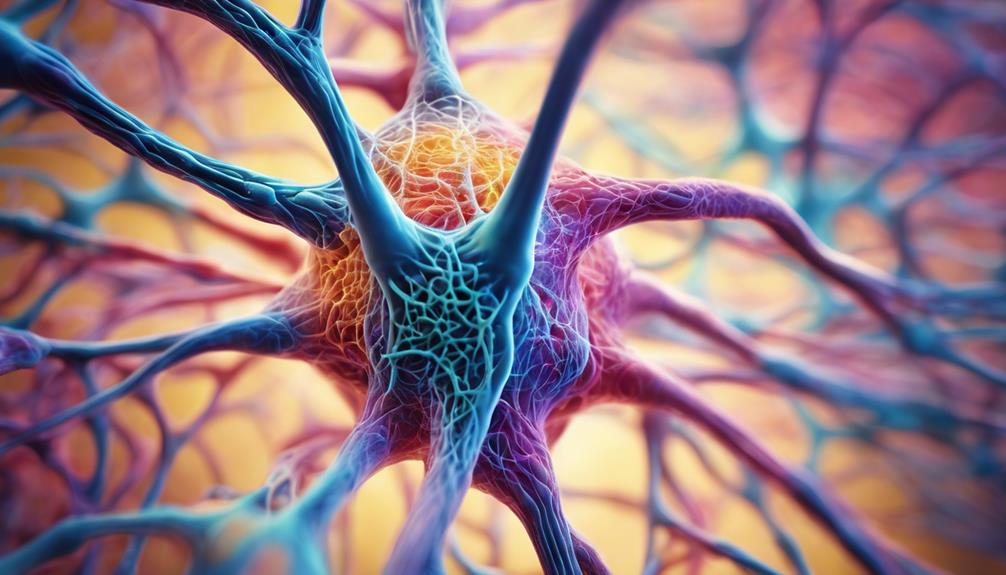
During the early stages of a baby's development, nerve connections begin forming in the womb, setting the foundation for essential brain functions.
These nerve connections are important for the transmission of signals between different parts of the brain, enabling the processing of sensory experiences and the development of higher brain functions.
As the pregnancy progresses, particularly by the third trimester, the baby's cerebral cortex exhibits heightened activity, marking a pivotal stage in nerve connection formation.
Post-birth, the process continues, with sensory experiences playing a key role in strengthening neural pathways.
Adequate stimulation through touch, sound, and visual cues is crucial for healthy nerve connection development.
These connections are fundamental for the baby to interpret information, regulate bodily functions, and respond to various stimuli in their environment.
Ensuring a rich sensory environment for the baby is paramount in nurturing the formation of these intricate nerve connections critical for their future cognitive and physical well-being.
Brain Development Post-Birth
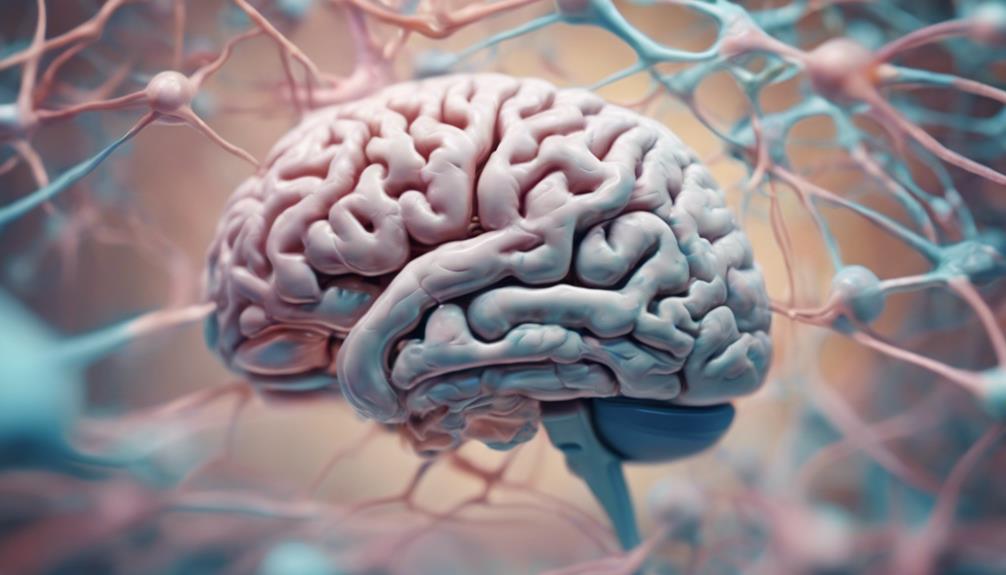
After birth, your baby's brain undergoes rapid growth, forming neural pathways at an astonishing rate during the early years.
These connections are essential as they lay the foundation for learning and development in the future.
Engaging in play and providing a nurturing environment are key factors that support ideal brain growth in your little one.
Early Brain Growth
In the first year after birth, your baby's brain undergoes rapid growth, doubling in size and forming important neural connections. This period is vital for the development of key brain regions such as the brain stem and limbic system. The brain stem controls basic functions like breathing and heart rate, while the limbic system is responsible for emotions and memory.
During this time, synapses in the brain form at a remarkable pace, facilitating rapid neural connections that shape your baby's cognitive abilities.
Neurons, the building blocks of the brain, receive signals through dendrites and transmit outgoing signals through axons. Myelin, a fatty substance, may coat axons to enhance communication efficiency.
Neural Pathways Formation
How do early experiences and interactions contribute to the rapid formation of neural pathways in your baby's developing nervous system?
After birth, your baby's brain undergoes a remarkable process of neural pathways formation, where synapses play an essential role in connecting neurons to enable efficient communication. Sensory stimulation from the environment, such as touch, sound, and sight, acts as a catalyst for the development of these neural connections. Positive experiences and repetitive activities further strengthen synaptic connections, shaping various functions like movement, language, and social skills in your baby.
Research indicates that nurturing interactions with caregivers play a significant role in this process, promoting healthy neural pathways essential for the best brain development.
In essence, the formation of neural pathways in your baby's brain post-birth is a dynamic process influenced by early experiences, sensory stimulation, and positive interactions. By providing a supportive environment with adequate nutrition, sleep, and nurturing care, you can enhance synaptic connections and contribute to the overall development of your baby's nervous system.
Influence of Early Experiences
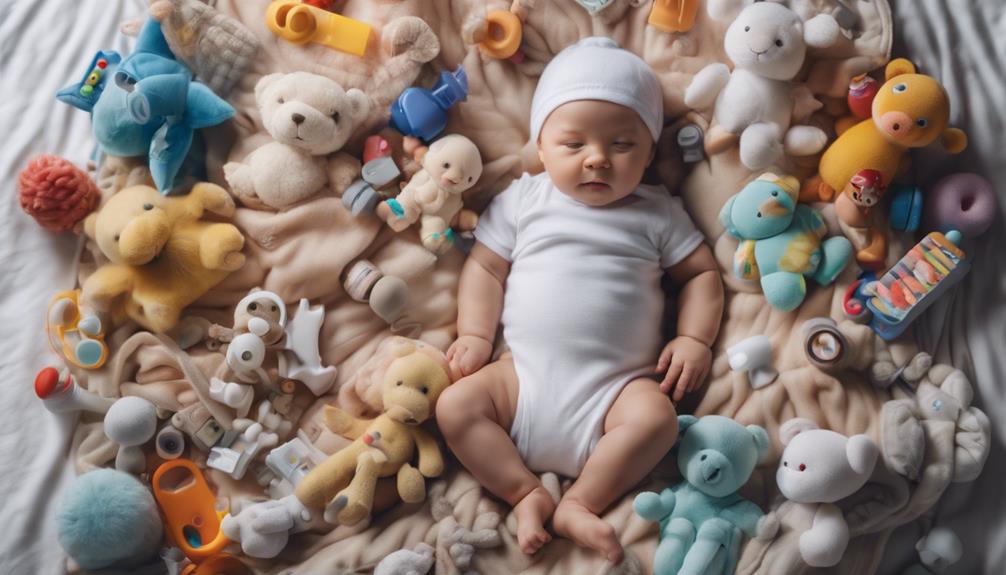
Early experiences play a pivotal role in shaping the development of a baby's nervous system. The neural connections in a baby's brain are greatly influenced by the environment they're exposed to.
Here are some key points to keep in mind:
- Stimulating Environments: Providing a stimulating environment can help strengthen the neural connections in a baby's brain. This can include age-appropriate toys, colorful visuals, and engaging activities that encourage exploration and learning.
- Important Interactions: Positive interactions with caregivers are vital for the healthy development of the nervous system. Responsive caregiving, affection, and verbal communication all play a part in shaping the baby's neural pathways and emotional development.
- Varied Sensory Stimuli: Exposure to varied sensory stimuli, such as different textures, sounds, and sights, supports the growth and organization of the baby's nervous system. This diversity helps the brain adapt and develop in response to the surrounding world.
Stimuli Impact on Brain Development
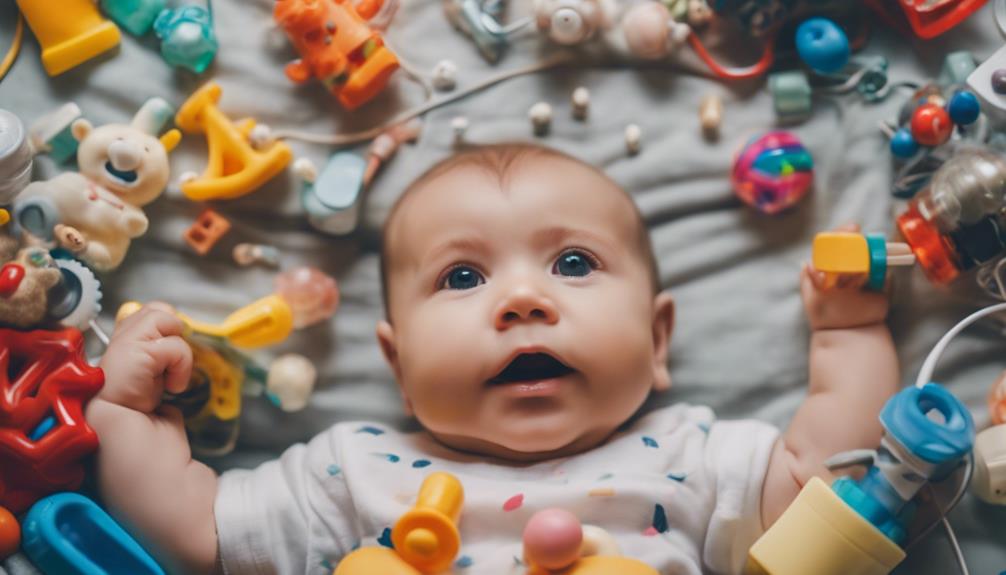
Stimulating sensory experiences greatly shape the development of neural connections in a baby's brain. Exposure to various stimuli like touch, sound, and movement is crucial for strengthening and refining the neural pathways responsible for processing information. Different stimuli activate specific brain areas, contributing to the development of sensory, motor, and cognitive functions in infants. This process not only promotes brain plasticity but also allows for the formation of complex neural networks essential for learning and development. Early exposure to diverse stimuli lays the groundwork for future learning, memory, and overall cognitive abilities in infants.
| Stimuli Impact on Brain Development | ||
|---|---|---|
| Key Points | Details | Importance |
| Sensory Experiences | Shape neural connections | Crucial for brain development |
| Brain Plasticity | Promoted by stimulating environments | Forms complex neural networks |
| Specific Stimuli | Activate brain areas | Develop sensory, motor, and cognitive functions |
| Early Exposure | Sets foundation for future learning | Enhances memory and cognitive abilities |
| Diverse Stimuli | Essential for optimal brain development | Paves way for enhanced learning abilities |
Nurturing Environment for Optimal Growth

Creating a nurturing environment for your baby is essential for ideal nervous system growth.
Stimulating sensory experiences, such as touch and sound, play a significant role in brain development.
Emotional bonding through positive interactions and secure attachments forms the foundation for a healthy nervous system in infants.
Stimulating Sensory Experiences
To foster ideal growth in a baby's nervous system, provide a nurturing environment rich in sensory experiences. Stimulating sensory inputs play an essential role in enhancing neural connections and promoting healthy brain development in infants. Engaging in activities that involve touch, movement, and visual stimulation can aid in the development of sensory processing skills, laying a strong foundation for future learning and cognitive abilities.
Exposure to various sensory experiences helps the infant's brain form new connections and pathways, contributing to the strengthening of the nervous system.
- Exploring different textures
- Experimenting with colors
- Listening to a variety of sounds
These sensory-rich experiences not only support the growth and refinement of the baby's nervous system but also foster overall cognitive and motor development. Providing a nurturing environment filled with sensory stimuli is essential for the healthy development of sensory integration and perception in infants.
Emotional Bonding Importance
Engaging in emotional bonding within a nurturing environment is essential for fostering excellent brain growth and development in babies. The emotional development of infants is heavily influenced by their early interactions with caregivers.
Positive experiences, such as loving touch and responsive communication, play a significant role in shaping neural pathways that regulate emotions and stress responses. Secure attachment formed through consistent care and emotional warmth establishes a foundation for healthy emotional regulation and social interactions.
According to experts, 'Building strong emotional connections early in life is necessary for the development of resilience and well-being in babies.' It's through these connections that infants learn to navigate the world around them and form meaningful relationships.
Therefore, creating a supportive and loving environment is crucial for promoting excellent brain development and setting the stage for positive social interactions throughout a child's life.
Play and Communication for Brain Development

For essential brain development in babies, prioritize play and communication to stimulate neural connections and promote healthy growth. Play is vital for boosting your baby's brain development as it helps in strengthening neural pathways and enhancing cognitive abilities. Engaging in interactive play activities with your baby not only fosters their social and emotional skills but also aids in problem-solving abilities.
Communication plays an important role in helping your baby learn language and acquire essential cognitive skills. Talking, singing, and reading to your baby are simple yet effective ways to support their brain development. Additionally, positive interactions and responsive communication with caregivers are crucial for optimal brain development in infants.
Encouraging exploration and providing sensory experiences through play can greatly help your baby develop fine and gross motor skills, setting a strong foundation for their overall growth and development.
Supporting Healthy Relationships

Building positive relationships with caregivers is essential for promoting healthy brain development in babies. Secure attachments with caregivers play an important role in regulating a baby's stress response and emotional well-being. Through responsive interactions and consistent care, a nurturing environment is created, which is crucial for ideal nervous system development. These healthy relationships provide a strong foundation for the development of social and emotional skills in infants. Emotional connections with caregivers support the growth of neural pathways associated with trust and security in babies.
To emphasize the significance of supporting healthy relationships in infant brain development, consider the following table:
| Aspects of Healthy Relationships | Impact on Brain Development |
|---|---|
| Secure Attachments | Regulates stress response and emotional well-being |
| Responsive Interactions | Creates a nurturing environment for ideal development |
| Emotional Connections | Supports growth of neural pathways related to trust and security |
| Consistent Care | Provides a foundation for social and emotional skills |
Frequently Asked Questions
How Does the Nervous System Develop in Infants?
As an infant, your nervous system rapidly develops after birth. Neurons form important connections for sensory and motor functions. Reflexes like the Moro and rooting reflexes show its significance. Sensory experiences shape cognitive and motor abilities.
What Is Important to a Child's Neurological Development?
To support your child's neurological development, provide ample nutrition, sensory stimulation, and a secure environment. Engage in consistent caregiving, responsive interactions, and offer emotional support. These essential experiences and interactions are vital for healthy brain development and overall well-being.
How Do I Know My Baby's Brain Is Developing?
You know your baby's brain is developing by observing milestones like tracking objects, responding to sounds, and reaching for toys. Watch for reflexes such as the Moro reflex and rooting reflex, and monitor motor skills and language growth.
At What Point Does a Child's Nervous System Begin to Develop?
When does your child's nervous system kick into gear? Well, around the third week of pregnancy, the neural tube gets the ball rolling. By the end of the first trimester, basic brain structures are already forming.
Conclusion
In summary, it's essential to understand the intricate process of baby nervous system development to provide the best possible environment for growth.
Remember, the brain is constantly forming new connections and pathways, shaping the future of your child's cognitive development.
So, next time you see your little one reaching for a toy or babbling in their crib, know that their brain is hard at work, laying the foundation for their future intelligence and abilities.

